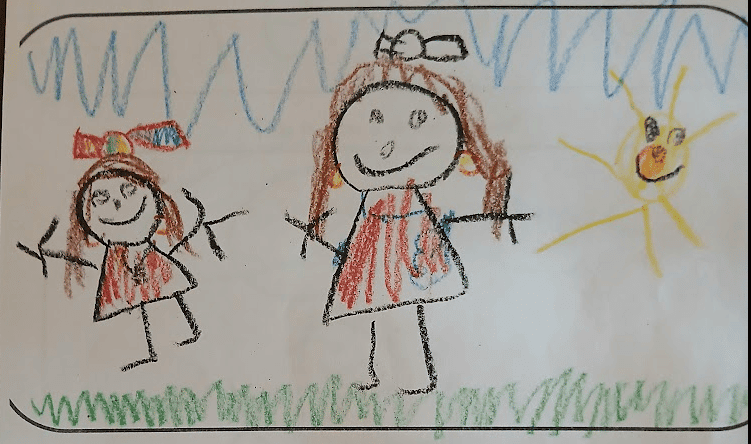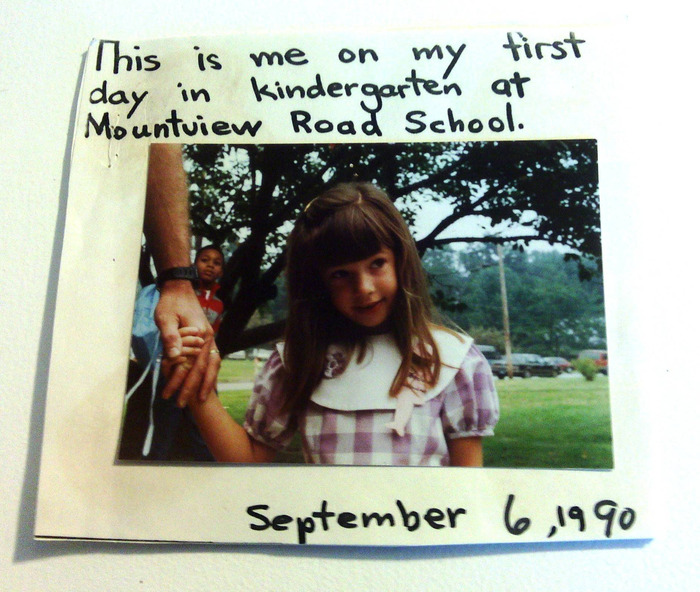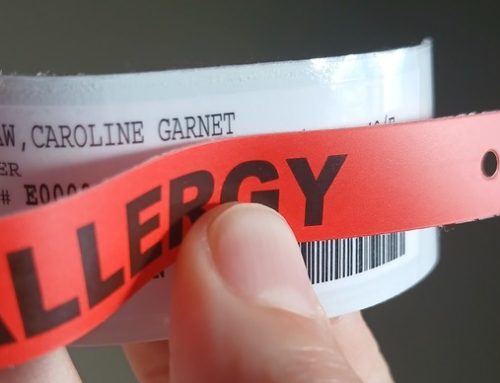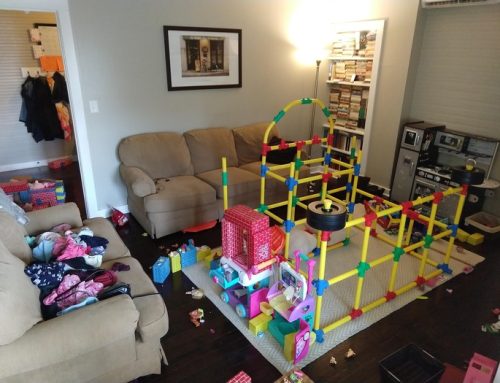I got my kids into their car seats, locked the car doors, and took a deep breath. From inside the rental house, I could hear my younger brother Willie shouting. He’d just begun melting down, repeatedly hitting our mom and banging his head against a wall.
So I’d taken the kids out to the car, and the three of us sat in the driveway, silent. My sixteen-year-old self – the parentified daughter – probably wouldn’t have left mid-meltdown. She would have felt too guilty to go. She would have tried to help, thinking that it was her responsibility.
My forty-year-old self, however, had two small children in her care. And once I got them to safety, we were all quiet. That is, until my four-year-old came out and said what we were all thinking: “Well, THAT was a little bit scary!”
“Yes, honey,” I said. “Yes, it really was.”
On the drive home, we debriefed; I answered their questions as best I could. My six-year-old said, “I’ve never seen Uncle Willie like that, Mommy. Have you?”
“Yes, sweetie. Many times.”
What does it mean to be a parentified daughter?
“Parentification is an emotionally abusive role reversal in which young children become physical or emotional caregivers for their parents or siblings.” That’s a quote from my first book, You Don’t Owe Anyone.
If you’ve read it, then you know that I used to watch teenage Willie melt down on a daily basis. I used to try and help him. I used to get hurt in the process. And while he’s more stable nowadays, he still has meltdowns sometimes. I’d hoped that my kids would never see one.
By the time we got home, though, my kids had already bounced back. They were racing off to play Barbies as though nothing had happened. But me? I was shaken up. My husband Jonathan held me, and it was a relief to feel something other than the old familiar grief.
Dear reader, odds are that you don’t have a severely autistic sibling with behavioral issues. But if you’re reading this, it’s likely that you’ve been through a lot. Most recovering perfectionists have. But were you parentified? What does it mean to be a parentified daughter? Let’s find out.
First, let’s clarify what parentification is not. It’s not children doing age-appropriate chores around the house, or older teenage siblings occasionally babysitting younger kids. Those fall within the realm of regular, healthy contribution to a family.
By contrast, destructive parentification passes the emotional abuse test. It means that you’re put into a position that’s not normal or healthy for your age: the position of having to physically or emotionally caretake your family members.
Signs of a parentified daughter
Examples of destructive parentification include, but are not limited to:
- Expecting children or teens to serve as coaches, confidants, or emotional supports for a parent, giving advice, mediating arguments, or helping the parent navigate the adult world
- Expecting children or teens to carry a heavy burden, such as dealing with family finances
- Leaving children alone for long stretches of time, telling them to “take care of things” (this is also neglect, but the overly responsible, highly capable child often masks it)
- Telling children or teens that the eternal salvation of another family member depends on whether they pray (this is also spiritual abuse)
- Demanding that children provide care for an ill, disabled, or mentally unwell family member
In short, if you see yourself in these signs of a parentified daughter, then at a young age you were often the one providing support, rather than receiving it.
In healthy family systems, parents provide support to their growing children, whereas in unhealthy family systems, the children are expected to provide support and/or narcissistic supply to the parents. The children’s need for safety and stability gets ignored.
Dear reader, what was it like for you growing up? Maybe you had a parent who was mentally unstable and denied reality. Maybe your classmates bullied you mercilessly. Maybe you grew up in a high-demand religious cult (and if so, hi, me too).
Whatever it was, you got the message early on that what you felt and needed simply didn’t matter. The adults around you weren’t handling things, so you learned to cope alone. You learned to carry it all, and never to falter. To tap-dance around that dark abyss and avoid failure at all costs.
Is it any wonder that you feel such a sense of over-responsibility now? Any wonder you try to be all things to all people? It’s been your survival strategy for years: be the helper, be the fixer, get it done. It’s how you adapted to a high-stress environment.
It’s a common pattern for eldest daughters, so much so that there’s a name for it: “Eldest Daughter Syndrome.”
What is eldest daughter syndrome parentification?
Eldest Daughter Syndrome isn’t a formal diagnosis; rather, it’s a cluster of traits shared by many eldest daughters, often arising from parentification.
Does this sound familiar?
- You have a heightened sense of responsibility; you feel the weight of high expectations.
- You struggle with consistently overextending yourself; “go mode” is your default setting.
- When you can’t keep going, you crash in secret…and those crashes are rough. You may have experience with depression and/or self-harm.
- You probably grapple with anxiety and one or more of its physical manifestations: insomnia, tension headaches, dizziness, gastro upsets, even dry eyes.
- You may have an autoimmune disorder or two.
- You’ve had some unhealthy friendships and romantic relationships, often over-functioning to keep the relationships going.
- You’re the one everyone leans on, but you’re tired of holding it all together. You’re quietly wondering, “But when do I get to just live my life?”
- You really want to rest more, to do nothing for a while, but you don’t actually know how to relax, play, and enjoy life.
- You listen to the song, “Surface Pressure” from Encanto and think, Whoa, did Lin-Manel Miranda write those lyrics about me?!
In case you’re wondering: Lin Manuel-Miranda wrote “Surface Pressure” for his older sister, Luz Miranda-Crespo. As he told Variety:
“I have a sister who’s six years older, and she got a raw deal. That song is my love letter and apology to my sister for having it easier. I watched my sister deal with the pressure of being the oldest and carrying burdens I never had to carry.”
He said it well; too often, oldest daughters deal with a lot of pressure. Let me give you another example of how this looks in real life.
Parentified daughter in adulthood
Last year, one of my coaching clients realized that her daily care and feeding of a feral cat had become an issue. Though she struggled to get enough sleep, she got up every day at 6am, traveled across town to feed this cat, then went into work.
By the time she came to see me, she had been doing this for 3 years! It might seem obvious to you that she needed to let this responsibility go. But it wasn’t obvious to her, just as your over-functioning probably isn’t obvious to you.
As parentified children, we learned early on to take on more than our fair share. For the parentified daughter in adulthood, doing too much feels normal!
(Dear reader, pause here and ask yourself: What burden have I shouldered that isn’t really mine to carry? Pause and wait for your answer to arise – we’ll come back to it in a minute.)
Back to my coaching client: Through our time together, she recognized that this feral-cat-care routine was really wearing her down. She decided to find a way to let it go. So she did what us recovering perfectionists do: she pushed hard to fix the situation.
She even built an elaborate trap for cat, to bring it to her neighborhood – but it didn’t work. Then she gave up trying to fix things. She surrendered. She’d set the intention to release her cat care responsibilities, but since no solution was forthcoming, she kept things the way they were.
Shortly after giving up, she trudged over to feed this feral cat yet again and got to talking with a neighbor. Upon hearing the situation, the neighbor joyfully offered to feed the cat going forward. It was a simple, elegant fix, and my client was thrilled.
But here’s the thing: when she was stuck in over-functioning mode, she couldn’t see this as a possibility! Early experience had taught her that she had to just keep going and handle everything on her own. That strategy served her well back when she was a child.
But as an adult, it was keeping her from receiving support. That’s what Eldest Daughter Syndrome parentification does: it teaches us to stay isolated, both from others and from our true selves.
When we have to become our own parents too early in life, we tend to be very hard on ourselves. Most of us learned early on how to show up strong and get stuff done, but we didn’t learn how to receive support, relax, or just play.
What would it be like, to break through the old pattern of self-punishment that has held you back for years? What would it be like to be kinder to yourself, to take steps in the right direction for you? To prioritize your own needs for a change?
It starts with using the word you probably weren’t allowed to say when you were younger: No. Press play on the video below to hear a gentle, practical way to reclaim your No. It’s called “The Most Essential Skill Nobody Taught You.”
Now that you’ve watched it, consider the issue that you identified above – the burden you’ve shouldered that isn’t really yours to carry. Consider: How might you set that burden down, even if just for today? And if you truly can’t set it down, how might you lighten it?
Here’s a quick cheat sheet when it gets overwhelming: When everything in your life feels like a push, then the #1 priority becomes rest. And when you don’t know which way to go next, then the #1 priority becomes stillness.
At this point I must warn you about the trick my mind plays on me whenever I realize I need to rest. Invariably, it tells me that I cannot possibly rest, because I’m a card-carrying workaholic and I’m just not capable.
At the same time, my mind also insists that I need to keep on working and do it all, because I can’t count on help; I’m the only one who’s capable!
Do you hear the contradiction there? I’m apparently incapable of any behavioral change, while also being the only one who is capable of getting anything done around here. Neither are true. It’s just my mind’s sneaky way of keeping me in my over-functioning zone.
What helps? Learning to listen to my body’s signals, and live in greater integrity. Also, asking for help from trusted friends – I’ve definitely texted my best friend to ask for her encouragement when I knew I needed to take a day off but felt nervous about actually doing it.
If you’re as tired as most parentified eldest daughters, you’re probably exhausted. But even as you yearn for rest and stillness, you’re also avoiding them. Because what if hurts from the past arise? What if it really hits you, just how much you missed?
This probably will happen. You probably will reckon with old hurts and uncomfortable truths. But you can breathe through them. You can center in your loving heart and be there for the little one who is hurting.
In that spirit, let me tell you one last story.
Parentified daughter as a mother
My oldest child started kindergarten this year. And on that first day at a new school, at that first drop off, my heart seized. Though we’d done plenty to prepare, I felt a sudden, strong need: Protect her! Keep her safe! Don’t let her go!
And then I turned around and looked at her face. Dear reader, that child was luminous. She was so excited, just absolutely lit up. If I could have taken a photograph of her in that moment, I would have. And I would have captioned it, “Put me in, coach!”
She walked into that new school wearing a bright red dress, full of confidence. She had a great first day. She even asked another kid to be her friend, and the kid said yes.

My kiddo’s drawing of herself and her new friend. How much of this friendship is based on the fact that both wore red dresses and big hair bows to the first day of school? Time will tell!
So obviously, the fear I was feeling was not about her. Not really. The child in front of me was ready, no question. 90% of me was so very happy for her. And 10% of me was so very sad for another child … the child I was 35 years ago, shy and shaky on her first day of kindergarten.
Gripping her dad’s hand, head down, barely looking up for the camera.

The truth is, that child wasn’t ready. But she made it through. She made it work at school. She earned good marks on her papers, and received labels like smart, capable, and responsible. She achieved. She won awards. She built a good life for herself.
And yet – and yet. There was always that underlying anxiety, that aching sadness. When would she be seen? When would she finally be safe enough to unmask and admit: I’m scared…?
So many of us were taught early on to ignore how we felt, to keep performing, to press the override button on our truth. We learned to always show up for others, even as we lost touch with our true selves. That changes now.
It’s time to stop doing it all and start doing what’s true. It’s time to create a life that welcomes you, instead of demanding more from you. You’ve carried enough, for long enough. It’s time to come home to yourself. To take off the mask, start trusting yourself, and become who you truly are.
In that spirit, I invite you to …
Get your copy of You Don’t Owe Anyone.
In it, I share personal stories of how I experienced life as a parentified daughter, and the exact exercises and tools I used to help begin recovering from that experience.
When you share proof of purchase for the print book, ebook, or audiobook on this page, you’ll receive valuable bonus gifts, including these videos:
- I don’t want to hurt people, but I want to tell my story.
- How to make the needed changes without upsetting others?
- Were you ever afraid to let people know your story?
Share This:
Comments
Related Posts



